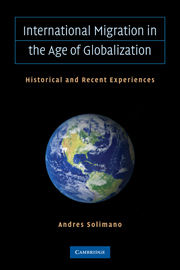Book contents
- Frontmatter
- Contents
- Acknowledgments
- 1 Introduction: Understanding the Trends, Themes, and Strata of International Migration
- 2 Why People Move or Stay Put: International Migration Is the Result of Compelling and Conflicting Factors
- 3 What Happens When International Migration Happens? The Dilemmas Posed by Migration
- 4 How Empires, Policy Regimes, and Economic Imperatives Influenced the Mobility of Capital and People in the 20th Century
- 5 Latin America: Where Volatile Economic Development, Political Crises, Poverty, and Remittance Income Is a Laboratory for Studying the Determinants of International Migration
- 6 Who Migrates and What They Offer: A Focus on People and Elites with Talent, Knowledge, and Entrepreneurial Skills
- 7 A Fair and Orderly International Migration Process Requires a Global Social Contract
- References
- Index
6 - Who Migrates and What They Offer: A Focus on People and Elites with Talent, Knowledge, and Entrepreneurial Skills
Published online by Cambridge University Press: 05 June 2012
- Frontmatter
- Contents
- Acknowledgments
- 1 Introduction: Understanding the Trends, Themes, and Strata of International Migration
- 2 Why People Move or Stay Put: International Migration Is the Result of Compelling and Conflicting Factors
- 3 What Happens When International Migration Happens? The Dilemmas Posed by Migration
- 4 How Empires, Policy Regimes, and Economic Imperatives Influenced the Mobility of Capital and People in the 20th Century
- 5 Latin America: Where Volatile Economic Development, Political Crises, Poverty, and Remittance Income Is a Laboratory for Studying the Determinants of International Migration
- 6 Who Migrates and What They Offer: A Focus on People and Elites with Talent, Knowledge, and Entrepreneurial Skills
- 7 A Fair and Orderly International Migration Process Requires a Global Social Contract
- References
- Index
Summary
Globalization has significantly increased the international mobility of highly talented people and “knowledge workers” from developing countries and post-socialist economies to wealthy OECD countries. This group includes a vast array of people – technology entrepreneurs, information technology (IT) experts, first-rate scientists, bright graduate students, skilled physicians, and gifted writers and artists. The number of these “high-value” migrants is far less than the number of unskilled people who are part of the “mass migration.” The proportion of foreign-born people with higher education is estimated at around 10 percent of the world's total number of international migrants. But this relatively small group of internationally educated people contributes disproportionately to new technological development, business creation, social service provision, and other forms of human creativity, and they have a huge economic payoff. In turn, nearly 90 percent of immigrants with a tertiary education concentrate in OECD countries – again with a disproportionate contribution that accrues primarily to wealthy countries, although as we saw in Chapter 3, source countries may also potentially benefit from these flows. We are confronting a situation in which most of the demand for talented individuals with important economic value is concentrated in the “north,” while part of the supply of the new talent comes from the “south,” in which such countries as China, India, Russia, Poland, and, to some extent, Latin American countries are becoming an important source of talented people in business and academia.
- Type
- Chapter
- Information
- International Migration in the Age of Crisis and GlobalizationHistorical and Recent Experiences, pp. 157 - 189Publisher: Cambridge University PressPrint publication year: 2010



